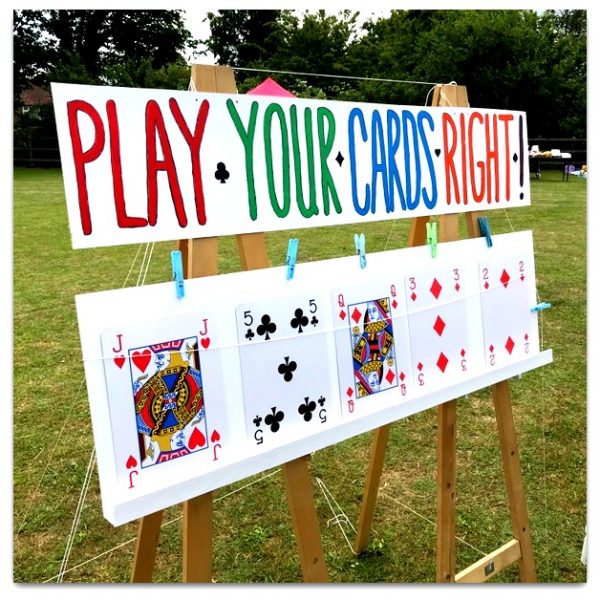
Higher or Lower, or Play Your Cards Right, is a card game using a standard deck of cards, where you have to guess whether the next card is going to be higher or lower than the one you have just turned over.
You can play it with different numbers of cards but for the game that we set up for our summer fair, we decided to pay with 5 cards. We bought these A4 playing cards from Amazon UK. (You can also get jumbo playing cards in the US but I am not sure how popular this game is there!)
The rules are that you turn over the first card and have to decide whether the next card is going to be higher or lower than the last one. You are allowed to change the first card for a new one if you want to. You get nothing for a pair so the game ends if you get 2 consecutive cards of the same number. Suits do not matter. Ace is high.
I wanted to test out the chances of winning higher or lower with 5 cards so I used a standard pack to play and did this 200 times. If I got a 7, 8 or 9 as my first card, I changed it. I was actually quite surprised at how many times I won and you can see my results as they unfolded from 100 goes onwards below:
These are my results:
24 wins out of 100 plays
26 wins out of 110 plays
30 wins out of 120 plays
33 wins out of 130 plays
35 wins out of 140 plays
37 wins out of 150 plays
40 wins out of 160 plays
41 wins out of 170 plays
43 wins out of 180 plays
47 wins out of 190 plays
53 wins out of 200 plays
So you can see from these figures that I won on average about one in every 4 tries. This was much more than I had expected to win so I needed to figure out what the prizes would be on this basis. We had decided on monetary prizes for this game as we had plenty of other games that had actual prizes.
Obviously if you won, it would be necessary to win more than the cost of playing the game! We had decided on £1 a go so the prize needed to be higher than that. We also needed to make some money as it was all going to the school.
So I decided that for every £1 spent, 50 would go for winnings and 50p to school funds. So in 200 goes, £100 would be winnings. It would also be necessary to have a biggish prize to lure people in to play, so £5 seemed a good number.
So I split the prizes as follows:
10 prizes would be needed for around 40 goes. So for each of those 10 prizes, the prize fund would need to be £20. This was split into prizes as follows:
1 prize of £5
6 prizes of £2
3 prizes of £1
There are 3 ways of doing this:
- You have these 10 prizes and once they are all won they go back into the prize pot together.
- Each prize goes back into the pot after it is picked
- You estimate the number of plays that will happen during the fair and add in the relevant number of winning tickets (we had 50 winning tickets for an estimate of 200 plays)
For options 2 and 3 you run the risk of the higher prizes being won too often so perhaps option 1 is best (we went with option 3 which in hindsight was not the best idea).
Obviously it is all a matter of chance as to how much money you can make on this so it is a bit of a gamble. People may well win more often than the odds predict or indeed less often. Or it might be better not to have cash prizes!
Thanks for this! K9 Crusaders in Redruth have been looking to run such a game at Murdoch Day this year. Knowing the odds helps us – though our prizes will be provided by donations!
Hi Charles, glad this was helpful. It’s always good when prizes are provided by donations! We ran this with cash prizes but I think we would reassess next time!